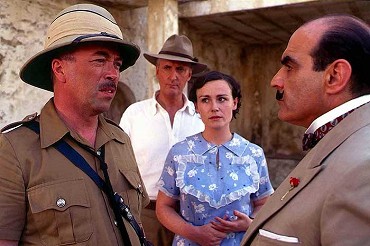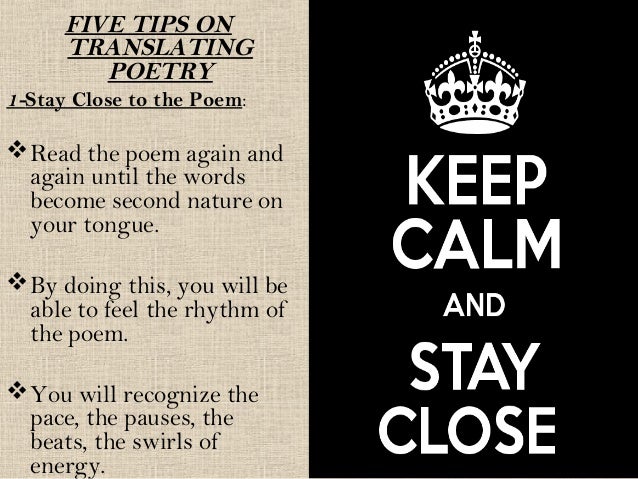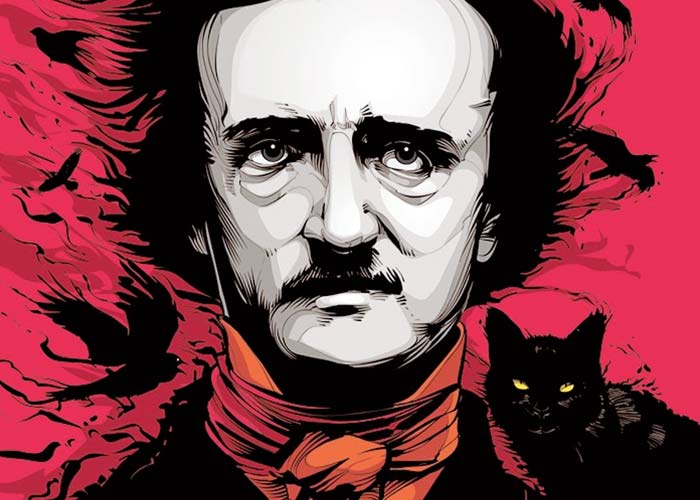V následující ukázce poněkud schází Poirotovy obvyklé poznámky ve francouzštině. Ty jsou pro něho natolik charakteristické, že je rozhodně nebudeme převádět ani do češtiny, ani do jiného jazyka - ochudili bychom čtenáře o efekt autorkou pečlivě cizelovaný a systematicky používaný.
Příklady Poirotova osobitého vyjadřování, charakterizovaného drobnými gramatickými odchylkami a výstřelky v jeho vzletných promluvách, najdete třeba zde: https://prekladanipvk.blogspot.com/2011/10/v-risi-nemejskeho-lva.html
_______________________________________________________________

Agatha Christie
Murder in Mesopotamia
Chapter 27
Beginning of a
Journey
‘Bismillahi ar rahman
ar rahim. That is the Arab phrase used before starting out on a journey. Eh bien
, we too start on a journey. A journey into the past. A journey into the
strange places of the human soul.’
I don’t think that up
till that moment I’d ever felt any of the so-called ‘glamour of the East’.
Frankly, what had struck me was the mess everywhere. But suddenly, with M.
Poirot’s words, a queer sort of vision seemed to grow up before my eyes. I
thought of words like Samarkand and Ispahan—and of merchants with long
beards—and kneeling camels—and staggering porters carrying great bales on their
backs held by a rope round the forehead—and women with henna-stained hair and
tattooed faces kneeling by the Tigris and washing clothes, and I heard their
queer wailing chants and the far-off groaning of the water-wheel.
They were mostly
things I’d seen and heard and thought nothing much of. But now, somehow they seemed
different —like a piece of rusty old stuff you take into the light and suddenly
see the rich colours of an old embroidery…
Then I looked round
the room we were sitting in and I got a queer feeling that what M. Poirot said
was true—we were all starting on a journey. We were here together now, but we
were all going our different ways.
And I looked at
everyone as though, in a sort of way, I were seeing them for the first time—and
for the last time—which sounds stupid, but it was what I felt all the same.
Mr Mercado was
twisting his fingers nervously—his queer light eyes with their dilated pupils
were staring at Poirot. Mrs Mercado was looking at her husband. She had a
strange watchful look like a tigress waiting to spring. Dr Leidner seemed to
have shrunk in some curious fashion. This last blow had just crumpled him up.
You might almost say he wasn’t in the room at all. He was somewhere far away in
a place of his own. Mr Coleman was looking straight at Poirot. His mouth was
slightly open and his eyes protruded. He looked almost idiotic. Mr Emmott was
looking down at his feet and I couldn’t see his face properly. Mr Reiter looked
bewildered. His mouth was pushed out in a pout and that made him look more like
a nice clean pig than ever. Miss Reilly was looking steadily out of the window.
I don’t know what she was thinking or feeling. Then I looked at Mr Carey, and
somehow his face hurt me and I looked away. There we were, all of us. And
somehow I felt that when M. Poirot had finished we’d all be somewhere quite
different…
It was a queer
feeling…
Poirot’s voice went quietly on. It was like a river running
evenly between its banks…running to the sea…
‘From
the very beginning I have felt that to understand this case one must seek not
for external signs or clues, but for the truer clues of the clash of
personalities and the secrets of the heart.
‘And I
may say that though I have now arrived at what I believe to be the true
solution of the case, I have no material proof of it . I know it is so, because
it must be so, because in no other way can every single fact fit into its
ordered and recognized place.
‘And
that, to my mind, is the most satisfying solution there can be.’
He
paused and then went on:
‘I
will start my journey at the moment when I myself was brought into the case—when
I had it presented to me as an accomplished happening. Now, every case, in my
opinion, has a definite shape and form . The pattern of this case, to my mind,
all revolved round the personality of Mrs Leidner. Until I knew exactly what kind
of a woman Mrs Leidner was I should not be able to know why she was murdered
and who murdered her.
‘That,
then, was my starting point—the personality of Mrs Leidner.
‘There
was also one other psychological point of interest—the curious state of tension
described as existing amongst the members of the expedition. This was attested
to by several different witnesses—some of them outsiders—and I made a note that
although hardly a starting point, it should nevertheless be borne in mind
during my investigations.
‘The
accepted idea seemed to be that it was directly the result of Mrs Leidner’s
influence on the members of the expedition, but for reasons which I will
outline to you later this did not seem to me entirely acceptable.
‘To
start with, as I say, I concentrated solely and entirely on the personality of
Mrs Leidner. I had various means of assessing that personality. There were the
reactions she produced in a number of people, all varying widely in character
and temperament, and there was what I could glean by my own observation. The
scope of the latter was naturally limited. But I did learn certain facts.
‘Mrs
Leidner’s tastes were simple and even on the austere side. She was clearly not
a luxurious woman. On the other hand, some embroidery she had been doing was of
an extreme fineness and beauty. That indicated a woman of fastidious and
artistic taste. From the observation of the books in her bedroom I formed a
further estimate. She had brains, and I also fancied that she was, essentially,
an egoist.
‘It
had been suggested to me that Mrs Leidner was a woman whose main preoccupation
was to attract the opposite sex—that she was, in fact, a sensual woman. This I
did not believe to be the case.
‘In
her bedroom I noticed the following books on a shelf: Who were the Greeks? ,Introduction
to Relativity ,Life of Lady Hester Stanhope ,Back to Methuselah ,Linda Condon
,Crewe Train.
‘She
had, to begin with, an interest in culture and in modern science—that is, a
distinct intellectual side. Of the novels, Linda Condon , and in a lesser
degree Crewe Train , seemed to show that Mrs Leidner had a sympathy and
interest in the independent woman – unencumbered or entrapped by man. She was
also obviously interested by the personality of Lady Hester Stanhope. Linda
Condon is an exquisite study of the worship of her own beauty by a woman. Crewe
Train is a study of a passionate individualist, Back to Methuselah is in
sympathy with the intellectual rather than the emotional attitude to life. I
felt that I was beginning to understand the dead woman.
‘I next
studied the reactions of those who had formed Mrs Leidner’s immediate circle—and
my picture of the dead woman grew more and more complete.
‘It
was quite clear to me from the accounts of Dr Reilly and others that Mrs
Leidner was one of those women who are endowed by Nature not only with beauty
but with the kind of calamitous magic which sometimes accompanies beauty and
can, indeed, exist independently of it. Such women usually leave a trail of
violent happenings behind them. They bring disaster—sometimes on others—sometimes
on themselves.
‘I was
convinced that Mrs Leidner was a woman who essentially worshipped herself and
who enjoyed more than anything else the sense of power . Wherever she was, she must
be the centre of the universe. And everyone round her, man or woman, had got to
acknowledge her sway. With some people that was easy. Nurse Leatheran, for
instance, a generous-natured woman with a romantic imagination, was captured
instantly and gave in ungrudging manner full appreciation. But there was a
second way in which Mrs Leidner exercised her sway—the way of fear. Where
conquest was too easy she indulged a more cruel side to her nature—but I wish
to reiterate emphatically that it was not what you might call conscious cruelty.
It was as natural and unthinking as is the conduct of a cat with a mouse. Where
consciousness came in, she was essentially kind and would often go out of her
way to do kind and thoughtful actions for other people.
‘Now
of course the first and most important problem to solve was the problem of the
anonymous letters. Who had written them and why? I asked myself: Had Mrs
Leidner written them herself ?
‘To
answer this problem it was necessary to go back a long way—to go back, in fact,
to the date of Mrs Leidner’s first marriage. It is here we start on our journey
proper. The journey of Mrs Leidner’s life.
‘First
of all we must realize that the Louise Leidner of all those years ago is
essentially the same Louise Leidner of the present time. ‘She was young then,
of remarkable beauty—that same haunting beauty that affects a man’s spirit and senses
as no mere material beauty can—and she was already essentially an egoist.
‘Such
women naturally revolt from the idea of marriage. They may be attracted by men,
but they prefer to belong to themselves. They are trulyLa Belle Dame sans Merci
of the legend. Nevertheless Mrs Leidner did marry—and we can assume, I think,
that her husband must have been a man of a certain force of character.
‘Then
the revelation of his traitorous activities occurs and Mrs Leidner acts in the
way she told Nurse Leidner. She gave information to the Government.
‘Now I submit that there was a
psychological significance in her action. She told Nurse Leatheran that she was
a very patriotic idealistic girl and that that feeling was the cause of her
action. But it is a well-known fact that we all tend to deceive ourselves as to
the motives for our own actions. Instinctively we select the best-sounding
motive! Mrs Leidner may have believed herself that it was patriotism that inspired
her action, but I believe myself that it was really the outcome of an
unacknowledged desire to get rid of her husband! She disliked domination—she
disliked the feeling of belonging to someone else—in fact she disliked playing
second fiddle. She took a patriotic way of regaining her freedom.
‘But underneath her consciousness was a
gnawing sense of guilt which was to play its part in her future destiny.
‘We now come directly to the question
of the letters. Mrs Leidner was highly attractive to the male sex. On several
occasions she was attracted by them—but in each case a threatening letter
played its part and the affair came to nothing.
‘Who wrote those letters? Frederick
Bosner or his brother William or Mrs Leidner herself ?
‘There is a perfectly good case for
either theory. It seems clear to me that Mrs Leidner was one of those women who
do inspire devouring devotions in men, the type of devotion which can become an
obsession. I find it quite possible to believe in a Frederick Bosner to whom
Louise, his wife, mattered more than anything in the world! She had betrayed
him once and he dared not approach her openly, but he was determined at least
that she should be his or no one’s. He preferred her death to her belonging to another
man.
‘On the other hand, if Mrs Leidner had,
deep down, a dislike of entering into the marriage bond, it is possible that
she took this way of extricating herself from difficult positions. She was a
huntress who, the prey once attained, had no further use for it! Craving drama
in her life, she invented a highly satisfactory drama—a resurrected husband
forbidding the banns! It satisfied her deepest instincts. It made her a romantic
figure, a tragic heroine, and it enabled her not to marry again.
‘This state of affairs continued over a
number of years. Every time there was any likelihood of marriage – a
threatening letter arrived.
‘But
now we come to a really interesting point. Dr Leidner came upon the scene—and
no forbidding letter arrived! Nothing stood in the way of her becoming Mrs
Leidner. Not until after her marriage did a letter arrive.
‘At
once we ask ourselves—why?
‘Let
us take each theory in turn.
…‘If Mrs
Leidner wrote the letters herself the problem is easily explained. Mrs Leidner
really wanted to marry Dr Leidner. And so she did marry him. But in that case, why
did she write herself a letter afterwards? Was her craving for drama too strong
to be suppressed? And why only those two letters? After that no other letter
was received until a year and a half later.
‘Now
take the other theory, that the letters were written by her first husband,
Frederick Bosner (or his brother). Why did the threatening letter arrive after
the marriage? Presumably Frederick could not have wanted her to marry Leidner.
Why, then, did he not stop the marriage? He had done so successfully on former
occasions. And why, having waited till the marriage had taken place , did he
then resume his threats?
‘The
answer, an unsatisfactory one, is that he was somehow or other unable to
protest sooner. He may have been in prison or he may have been abroad.
‘There
is next the attempted gas poisoning to consider. It seems extremely unlikely
that it was brought about by an outside agency. The likely persons to have
staged it were Dr and Mrs Leidner themselves. There seems no conceivable reason
whyDr Leidner should do such a thing, so we are brought to the conclusion
thatMrs Leidner planned and carried it out herself.






